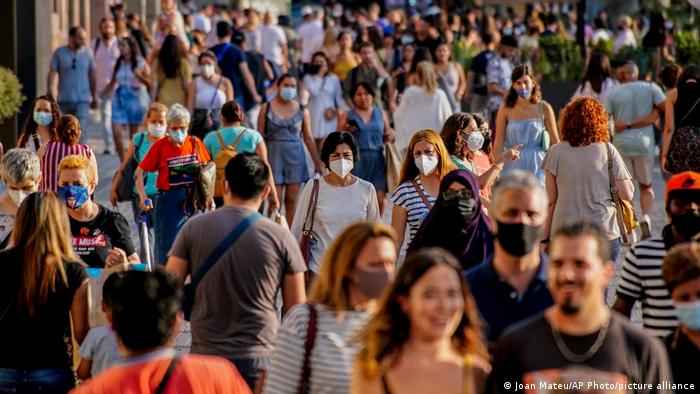
Berlin: The world needs to invest more to avoid a COVID pandemic-like situation in the future, according to a panel of experts convened by the G20. They presented a report to G20 finance ministers during a summit in Venice, Italy.
"The world is far from equipped to prevent or stop the next pandemic. There is every likelihood that the next pandemic will come within a decade — arising from a novel influenza strain, another coronavirus, or one of several other dangerous pathogens," said the High Level Independent Panel in their report.
The panel recommended that nations collectively commit to increasing spending for prevention and preparedness by at least $75 billion (€63 billion) over the next five years.
Europe
Germany recorded 952 new cases on Saturday, bringing the tally to 3,735,420. Data from the Robert Koch Institute, the country's health authority for infectious diseases, said the death toll rose by 35, coming up to 91,225.
Asia Pacific
Australia's New South Wales reported 50 new cases of community transmission, its highest daily rise in locally acquired infections.
Officials said 26 of the new cases had spent time in the community while being infectious.
"I think it is pretty clear that unless we reduce that level of people in the community that are infectious, we won't be able to turn things around as quickly as we can or as quickly as we should," said State Premier Gladys Berejiklian in an interview.
Health authorities said no fully vaccinated people have required hospital care and 79% of those admitted have received no vaccine doses.
South Korea reported 1,378 new cases in the past 24 hours, its highest daily rise, said the Korea Disease Control and Prevention Agency (KDCA).
Capital city Seoul and neighboring areas will be placed under strict restrictions starting Monday. South Korea has fully vaccinated about 11% of its population. The country aims to inoculate 70% of its people by September this year.
Americas
Rio de Janeiro has allowed football fans to attend the Copa America final against Argentina, at the Maracana stadium. However, only up to 7,800 people, or 10% of the stadium's capacity will be allowed to attend.
Spectators will need to present a negative COVID test taken 48 hours in advance and will be asked to observe social distancing inside the venue.
Africa
Senegal signed an agreement with the European Union, the US, some European nations and other partners to allow vaccine production at the Pasteur Institute in Dakar. A new plant, set to start construction this year, is expected to produce 25 million vaccine doses each month by the end of 2022.
The move comes as Africa battles a third wave of the virus and a shortage of vaccines. The new vaccine site will lay the foundation of "pharmaceutical and medical sovereignty, and also increase access to affordable vaccines in Africa, and enable vaccine production to rapidly respond to new pandemics," said Senegal's Economy Minister Amadou Hott.
World
The World Health Organization (WHO) said there was a possible link between coronavirus vaccines using mRNA technology and a rare heart inflammation.
Cases of myocarditis—inflammation of the heart muscle, and pericarditis—inflammation of the lining around the heart, had been reported in some countries.
"The reported cases have typically occurred within days of vaccination, more commonly among younger males and more often following the second dose the of COVID-19 mRNA vaccines," said a statement by the Global Advisory Committee on Vaccine Safety (GACVS). However, the committee maintained that the benefits of the vaccines outweighed the risks.